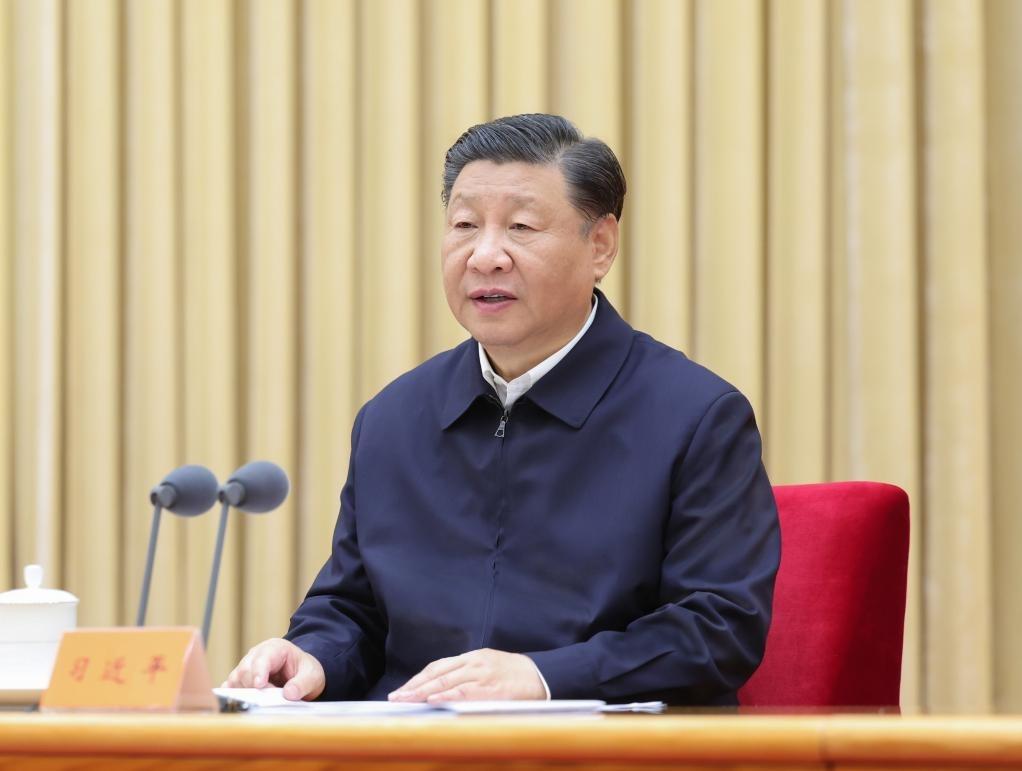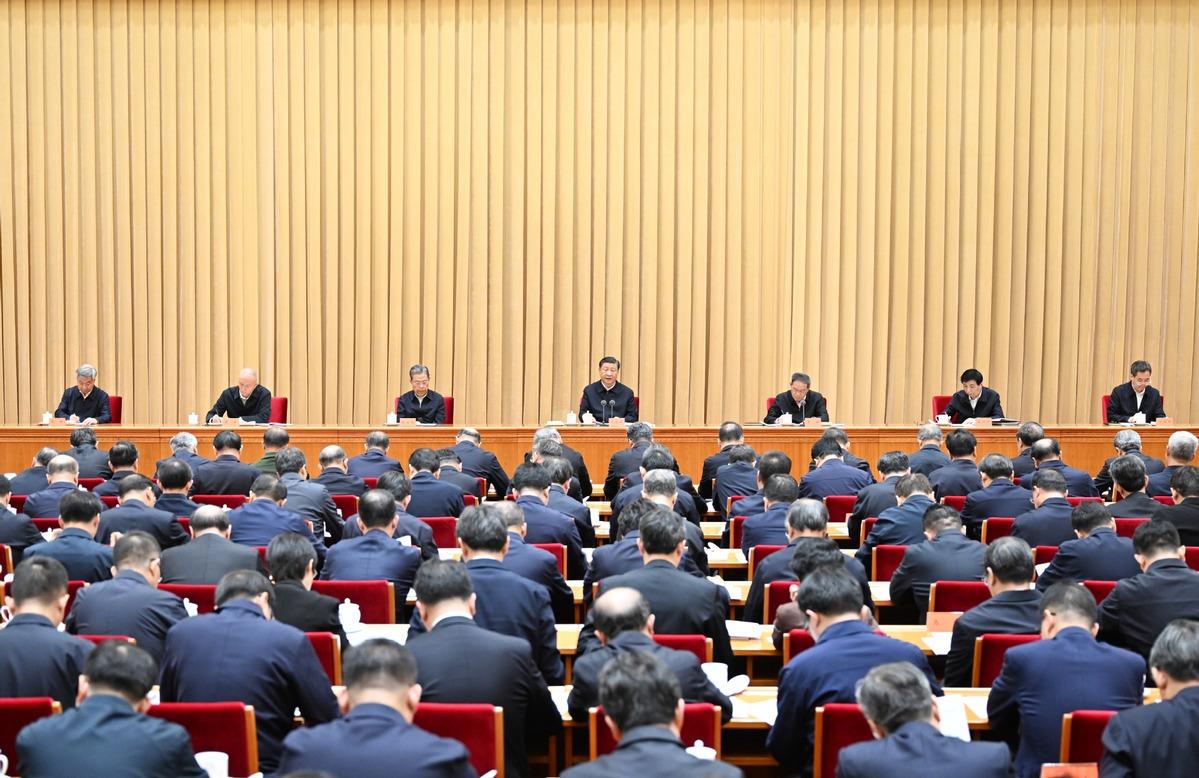National conference stresses high-quality services for economic, social development
 Xi Jinping, general secretary of the Communist Party of China Central Committee, also Chinese president and chairman of the Central Military Commission, delivers an important speech at the central financial work conference in Beijing, capital of China. The central financial work conference was held in Beijing from Monday to Oct 31, 2023. (PHOTO / XINHUA)
Xi Jinping, general secretary of the Communist Party of China Central Committee, also Chinese president and chairman of the Central Military Commission, delivers an important speech at the central financial work conference in Beijing, capital of China. The central financial work conference was held in Beijing from Monday to Oct 31, 2023. (PHOTO / XINHUA)
China's top leadership has outlined steps to build up the nation's competitiveness in the financial sector, highlighting the need to strengthen financial regulation across the board, improve the financial system and optimize the sector's services while preventing and defusing risks.
The two-day, tone-setting central financial work conference, which concluded on Tuesday in Beijing, underscored that the nation will always maintain the prudent nature of its monetary policies, with a greater focus on conducting cross-cyclical and countercyclical adjustments.
Xi Jinping, general secretary of the Communist Party of China Central Committee, delivered key remarks at the conference, laying out plans for the financial sector for the current and coming period. In addition to Xi, who is also Chinese president and chairman of the Central Military Commission, other members of the Party's core leadership also attended the meeting.
China first convened a national conference on the financial sector in 1997, with the most recent conference, the fifth, held in 2017.
The financial sector is the lifeblood of a nation's economy and a crucial component of a country's core competitiveness, according to a summary of the conference.
While highlighting the strong support from the financial system for the overall development of China's economy and society beginning in 2012, policymakers said various contradictions and problems in the financial sector have intertwined with and influenced each other, with some problems remaining prominent and many hidden economic and financial risks persisting.
They pointed out that the quality of financial services and the role of these services in helping the real economy have room to improve, with financial irregularities and corruption problems remaining and financial regulation and governance having a lack of strength.
The meeting stressed the need to uphold and strengthen the Party's across-the-board leadership over financial work, saying that China must target the building of a nation with a strong financial sector, promote the sector's high-quality development and deepen its supply-side structural reform.
The financial sector must provide high-quality services for economic and social development, including steps to create an enabling monetary and financial environment and strengthen top-notch financial services to major strategies, key sectors and weak links, the summary said.
More financial resources should be channeled to promoting science-technology innovation, advanced manufacturing, green development, and micro, small and medium-sized enterprises, it added.
 Xi Jinping, general secretary of the Communist Party of China Central Committee, also Chinese president and chairman of the Central Military Commission, delivers an important speech at the central financial work conference in Beijing, capital of China. The central financial work conference was held in Beijing from Monday to Tuesday. Li Qiang, Zhao Leji, Wang Huning, Cai Qi, Ding Xuexiang and Li Xi also attended the conference. (PHOTO / XINHUA)
Xi Jinping, general secretary of the Communist Party of China Central Committee, also Chinese president and chairman of the Central Military Commission, delivers an important speech at the central financial work conference in Beijing, capital of China. The central financial work conference was held in Beijing from Monday to Tuesday. Li Qiang, Zhao Leji, Wang Huning, Cai Qi, Ding Xuexiang and Li Xi also attended the conference. (PHOTO / XINHUA)
The policymakers called for strong financial support for strategies regarding innovation-driven development, regional coordinated development and ensuring national food and energy security. They also urged efforts to bolster sci-tech, green and inclusive financing and the sector's integration with elderly care and the digital technology.
Efforts should be made to build modern financial institutions and market systems, facilitate the flow of funds into the real economy, optimize the financing structure, better leverage the role of the capital market as a hub, and promote the further development of a registration-based initial public offering system, the conference summary said.
The nation will diversify equity financing, improve the quality of listed companies, nurture top-tier investment banks and institutions, promote the high-quality development of the bond market and support large State-owned financial institutions in becoming stronger and better, it added.
Meanwhile, strict standards for admission and regulatory requirements will be applied to small and medium-sized financial institutions, and they will be required to focus on conducting distinctive operations tailored to local conditions, the policymakers said.
The meeting pledged to advance the high-level opening-up of the financial sector while ensuring national financial and economic security.
It stressed the need to make parallel efforts in bringing in overseas institutions and encouraging domestic institutions to go global, and to steadily expand the sector's institutional opening-up.
China will make it easier for cross-border investment and financing as part of a bid to attract more foreign financial institutions and long-term capital to invest and operate in the country, the summary said.
The policymakers pledged to strengthen the competitiveness and influence of Shanghai as an international financial hub, while consolidating and elevating the status of Hong Kong as an international financial center.
The conference emphasized the strengthening of financial regulation across the board to effectively prevent and resolve financial risks.
The nation will also establish a long-term mechanism for preventing and resolving debt risks at local levels, and will optimize the debt structure of the central government as well as local governments, the summary said.
As for the real estate sector, the conference stressed the need to strengthen the regulatory framework for real estate enterprises, improve supervision of their capital, enhance macroprudential regulation in the real estate financing sector, and offer businesses of different ownership types equality in terms of meeting their reasonable financing needs.
China will strengthen the management of its foreign exchange market and continue to maintain the stable exchange rate of the yuan at an adaptive and balanced level, the summary said.


